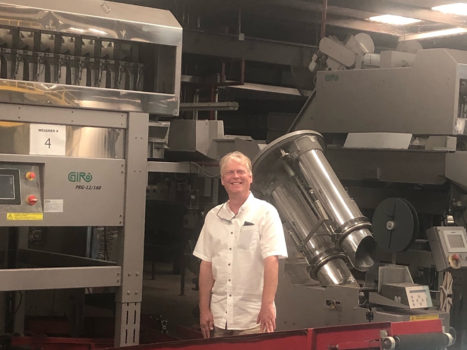Featured image: Geoff Cutler, courtesy of Race-West Company
Recently OnionBusiness caught up with Geoff Cutler of Race-West Company in Clarks Summit, PA, and we are so grateful to have this very complete – and blessedly upbeat – update from him.
We asked Geoff to fill us in on anything new in the operation, and he started off by saying, “Thankfully we have been very busy helping our farm partners and customers navigate this tricky COVID-19 business roller coaster ride.”
Geoff continued, “With COVID really tearing through our lives, we wanted to make sure that our staff and our families were taken care of. We made it our top priority to make sure no one lost their job and that everyone was able to work safely. We have gone with a combination of working from home and working in the office. It’s been on a case-by-case basis, depending on people’s comfort level. And It has been a balancing act to keep everyone safe and keep our customers happy.”
He added, “We feel proud that we have actually been able to create a few new jobs to help people who are looking for work.”
Regarding changes to the onion program specifically, Geoff said, “2020 has been a year like no other. It has caused all of us to re-think our business strategy, our partnerships, our supplies, packaging ideas and everything in between.” He explained, “Prior to March, it seemed as though 2020 was going to be just another year. We were continuing to build our relationships with our core partners, we were making new friends where it was mutually beneficial, and we were continuing to champion the overall increase in onion consumption in the USA.”
Geoff said that business “has been trending toward deeper partnerships and high levels of trust amongst trading partners. Our business was founded on these principles, so we were really feeling like we were hitting our stride.”
COVID-19, he said, brought a unique set of game rules with it. “In many ways the business profoundly changed, and in others it really reverted back to normal. In the beginning of COVID, the business became completely one-dimensional. That dimension was retail. The business would move in ebbs and flows, in the traditional cycles of their usage. Really strong two weeks, followed by very dull two weeks.”
On the other hand, he said, “Our foodservice, wholesale and process communities were reeling at the very beginning. There was so much unknown. However, as time went on, as an industry we adapted and were able to put our collective businesses back together. Traditionally, my father always taught me ‘never put all your eggs in one basket’ in practice. That meant for us that we try to always keep a diversified business with a good mix of all segments of industry, so that if one goes down, we don’t go down with it.”
And, Geoff said, “As time went on, we saw our business slowly get back to normal.”
There’s even been that proverbial silver lining: “One of the positive changes in the business due to COVID has been that the terminal markets have found a renewed sense of purpose and utility in the marketplace. Not many places carry so many products and are able to react in the same way a terminal market receiver can. We have seen the strong get stronger, and COVID has really rallied all our trading partners closer together and allowed us to really get ourselves in lockstep with both our suppliers and our customers.”
There is a definite downside as well, he said. “Sadly, we have witnessed our small foodservice customers struggling with their accounts, and their businesses have really downscaled. As they are slowly coming back, we have just been hit with the second wave. Absent government assistance, they will not make it.”
Geoff said the produce family is stepping up, noting, “It is tragic, and we are helping all of those who have reached out to us for support. It takes a produce family, caring for those in pain. We are very happy to be able to help”.
In the wake of the pandemic, Geoff continued, some changes in operational protocol have become standards.
“Food safety was important prior to COVID,” he stated. “It has become the most important element in the produce business at this point. The whole industry is demanding high levels of compliance and transparency in the food supply chain, and I don’t think it will change anytime int he future.”
Additionally, he said, “The price shopping that went on in the past has been curbed by the ability to present food-safe merchandise to the marketplace. Growers with weak or non-existent food safety will find it impossible to survive in a COVID and post-COVID world. My father instituted a policy of ‘no food safety, no orders no exceptions.’”
Looking at his home turf of the Northeast, Geoff said the initial effects of the pandemic lockdown were “devastating.” He said, “With such density, the only option was to institute statewide lockdowns. Some businesses closed, others scaled back, and the rest sat and tried to bide their time. Over time, we were able to figure out how to continue to service our communities. It started with food donations. As a family we donated five-plus trailers of produce to local food banks in an effort to ensure no one went hungry. Our top priority was to do everything we could to help feed people in a time of crisis.”
And, “As time went on, we found that the world was not going to end, and that we needed to get back to work. The restaurant and foodservice business got heavily involved in takeout and delivery services, which caused our business to get back to work.”
While the pandemic was certainly overarching in everyone’s minds, there was also the matter of a California-based onion recall this year. Geoff said, “I remember the initial investigations and all of the phone calls and speculation that went along with it.”
Then, he said, “The NOA did an exceptional job handling the recall on a national level with the FDA and USDA. Knowing the family involved made the event very personal to us, and we are so proud of the integrity and the special courage they have shown in getting their product identified and out of any potential to impact the industry.”
When asked what the end of 2020 and the future hold, Geoff said, “It all depends on government involvement in our industry. At times, with things like the Food Box program, it was great. The box program allowed for our markets to stay strong the last six or seven months and kept excess product not being used in foodservice from destroying the price of onions. The flipside of the coin is government mandate on the restaurant business and food service industries with closures, limits on seating and revised hours of operation. They can make life very difficult.”
In short, he said, “I think COVID is going to seriously alter our traditional holiday business. In the Northeast there are mandates to limit family functions and to cut back on traditional restaurant experiences. I hope as an industry we can pivot once again to keep ourselves relevant in people’s minds and on people’s plates.”
Geoff concluded, “One most interesting observation is that foodservice recognizes the strong position of cooking fresh onions as the base of almost every meal. Fresh onion shipments are way off, and that is because foodservice uses so many more onions than retail. Home cooking is in the process of discovering that as well, and if we get our message right and help retail customers learn the value of start with a large onion or two medium onions for all food preparation, they will double consumption.
“When the restaurants finally get back, we will have the benefit of two very strong horses carrying our wagons.”
Thanks to Geoff for sending photos of the Race-West operation and COVID-19 food donations.


